Rust 学习笔记
Rust 学习笔记
Rust具有一些让人眼前一亮的特点:无GC也不需手动管理内存、高性能、安全性强等等。但其诸多优点背后的代价,就是学习曲线相当陡峭。
Rust的困难,不在于语言特性,而在于:
- 具体实践中如何运用学到的技巧
- 遇到了坑时(生命周期、借用错误,自引用等)如何迅速、正确的解决
- 大量的标准库API的熟练使用,这是保证开发效率的关键
错误处理相关
将Option类型转换为Result类型
使用ok_or方法:
fn foo(abs_path: &str) -> Result<String, String> {
let path = PathBuf::from(abs_path);
let relative = path.file_name()
.ok_or(format!("Failed to get relative_name for `{}`", abs_path))?;
let res = relative.to_str().unwrap();
Ok(res.to_owned())
}将Result类型转换为Option类型
使用ok方法:
fn divide(dividend: f64, divisor: f64) -> Result<f64, String> {
if divisor == 0.0 {
Err(String::from("除数不能为零"))
} else {
Ok(dividend / divisor)
}
}
#[test]
fn test_divide() {
let result_ok: Result<f64, String> = divide(10.0, 2.0);
let option_some: Option<f64> = result_ok.ok();
assert_eq!(option_some, Some(5.0));
let result_err: Result<f64, String> = divide(10.0, 0.0);
let option_none: Option<f64> = result_err.ok();
assert_eq!(option_none, None);
}Option#transpose()
将Option<Result<T, E>>转换为Result<Option<T>, E>:
#[derive(Debug, Eq, PartialEq)]
struct SomeErr;
let x: Result<Option<i32>, SomeErr> = Ok(Some(5));
let y: Option<Result<i32, SomeErr>> = Some(Ok(5));
assert_eq!(x, y.transpose());实际应用:
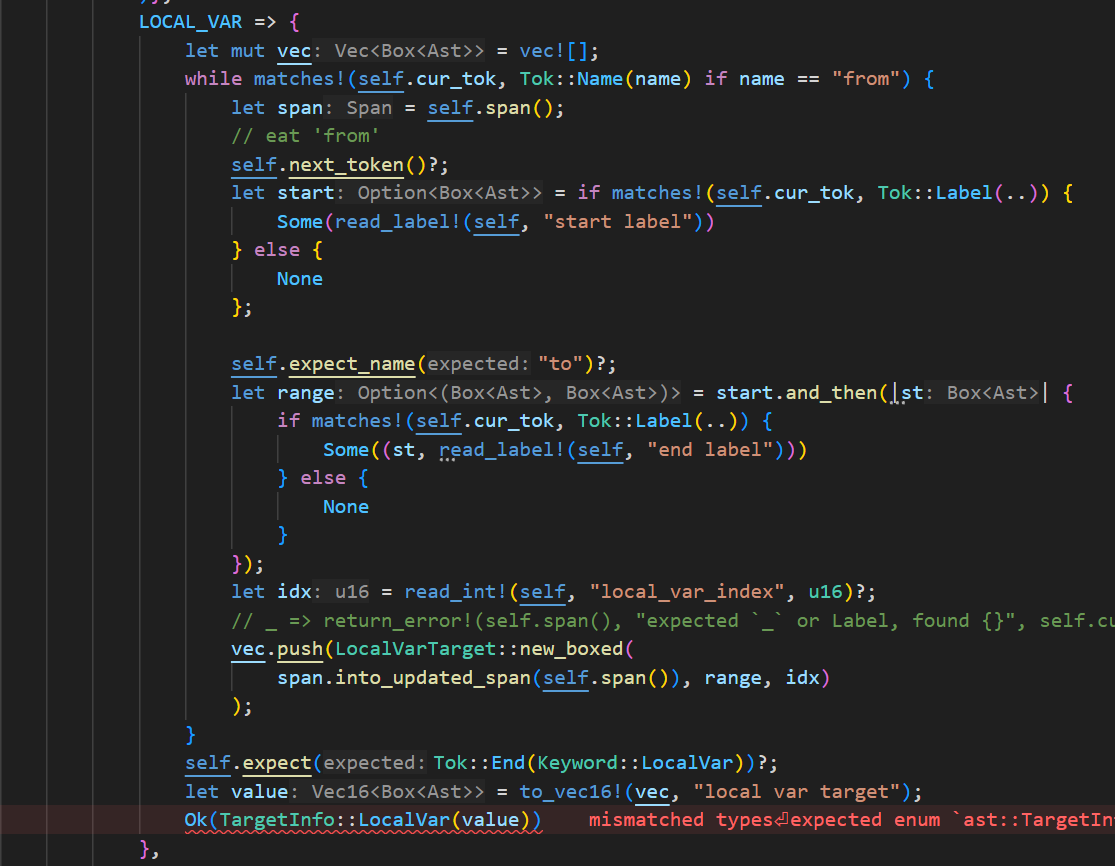
Before
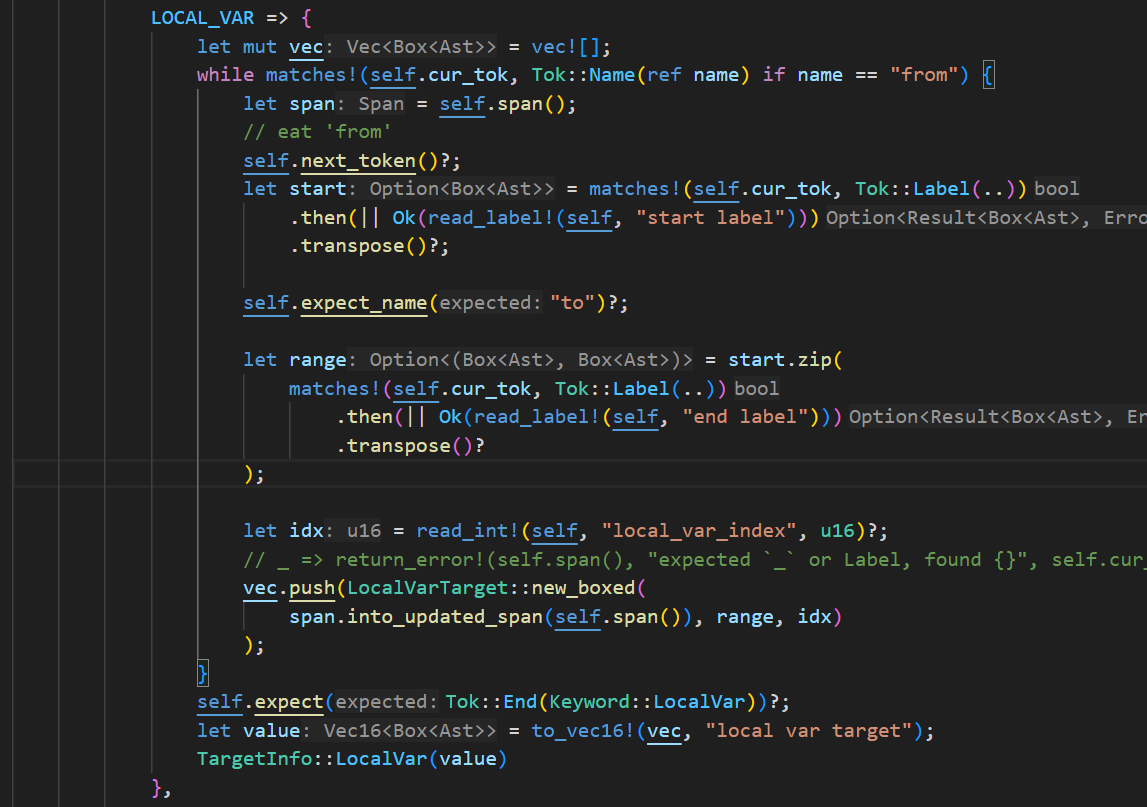
After
类型推断 + impl Trait 问题
错误代码:
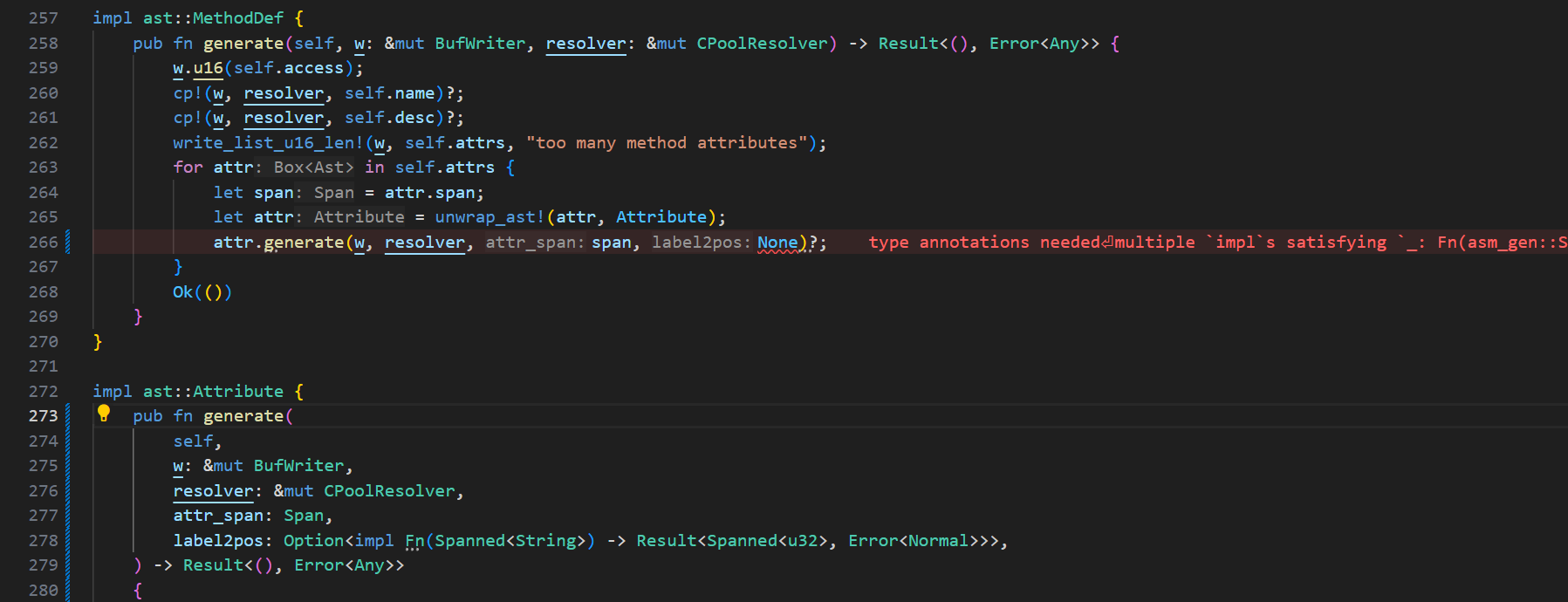
在传None处,编译器完全不知道这个 Fn 的具体类型是什么,所以报错。
方案一:把 impl Fn 提升为泛型参数
修改签名
pub fn generate<F>(
self,
w: &mut BufWriter,
resolver: &mut CPoolResolver,
attr_span: Span,
label2pos: Option<F>,
) -> Result<(), Error<Any>>
where
F: Fn(Spanned<String>) -> Result<Spanned<u32>, Error<Normal>>,
{
...
}使用方式
attr.generate(w, resolver, span, Some(label2pos))?;
attr.generate::<fn(Spanned<String>) -> _>(w, resolver, span, None)?;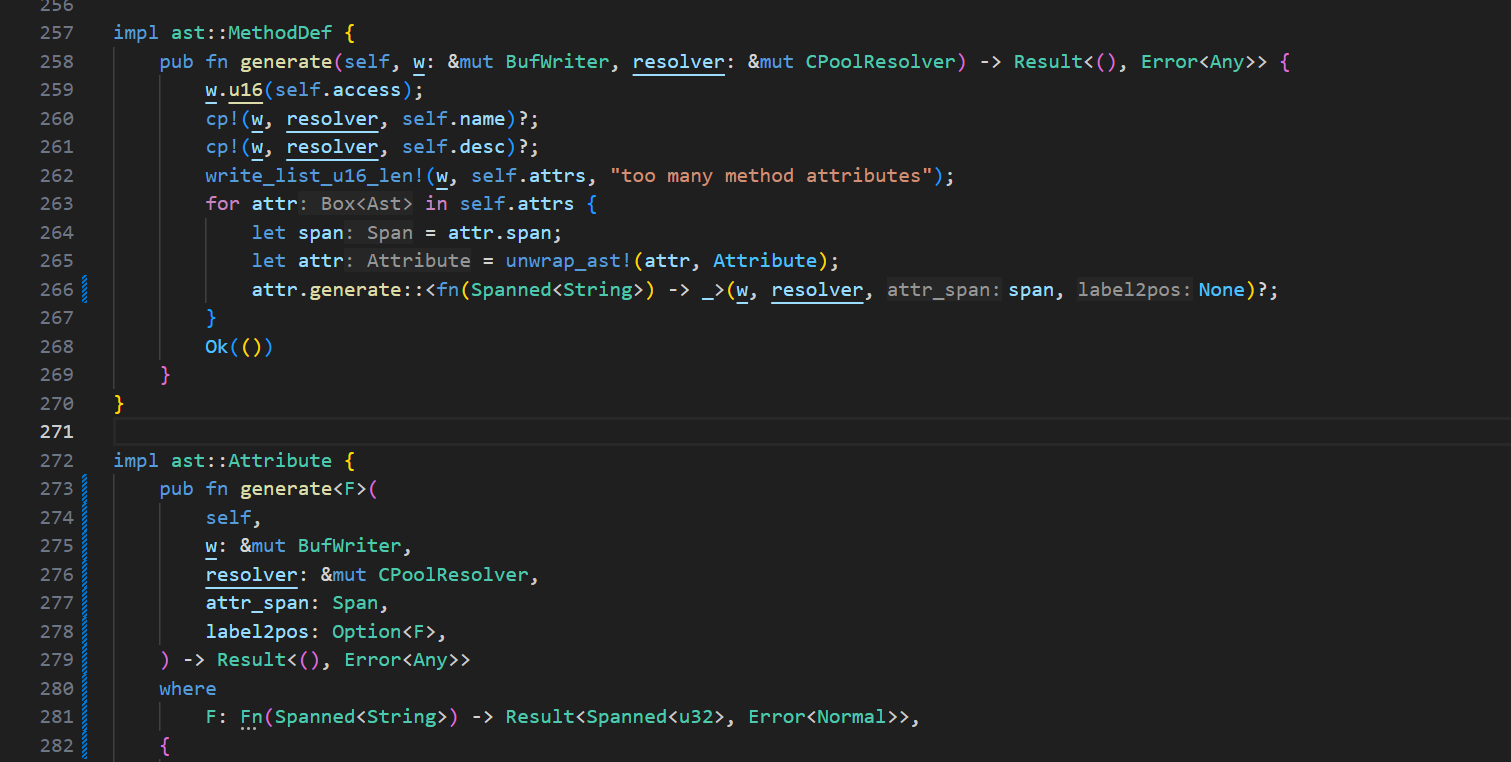
方案二:使用 trait object
这是 API 设计上最干净、调用最舒服的方式。
修改签名
pub fn generate(
self,
w: &mut BufWriter,
resolver: &mut CPoolResolver,
attr_span: Span,
label2pos: Option<&dyn Fn(Spanned<String>) -> Result<Spanned<u32>, Error<Normal>>>,
) -> Result<(), Error<Any>> {
...
}使用方式
attr.generate(w, resolver, span, Some(&label2pos))?;
attr.generate(w, resolver, span, None)?;- ✅ 完全解决问题
- ✅ 调用点最清爽
- ⚠️ 只有一次动态分发,通常可以忽略
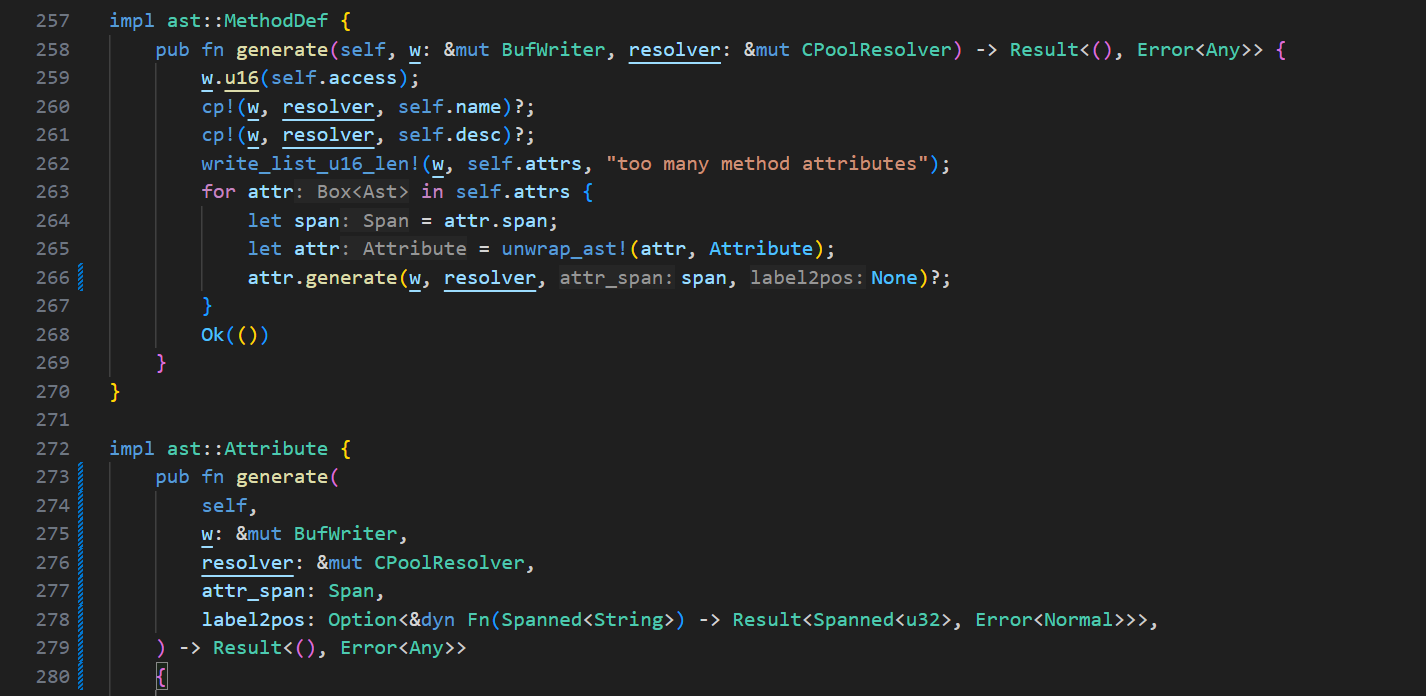
方案三:如果你其实只需要函数指针
如果 label2pos 不是捕获环境的闭包,直接用函数指针fn(Spanned<String>) -> Result<Spanned<u32>, Error<Normal>>>即可。
条件编译
如果你希望某段代码在debug(默认 cargo run / cargo test)时启用,但在release模式下不启用, 请使用 #[cfg(debug_assertions)] 而不是 #[cfg(test)]。
#[cfg(test)] 只在「当前 crate 作为 测试目标 编译时」才生效。
使用原生指针和unsafe实现自引用
algo.course.rs上的实现,在此记录一下
pub struct Tree {
count: usize,
root: *mut Node,
}
#[derive(Debug)]
struct Node {
data: i32,
// Null指针这里代表"None`; right.is_null() ==> 没有right child
left: *mut Node,
right: *mut Node,
parent: *mut Node,
}
impl Tree {
pub fn new() -> Self {
Self {
count: 0,
root: std::ptr::null_mut(),
}
}
// 返回tree的节点数量
pub fn node_count(&self) -> usize {
assert!(self.count != 0 || self.root.is_null());
self.count
}
// 在tree中新增一项,插入成功则返回true,若给定的数据在tree上已经存在,则返回false
pub fn insert(&mut self, data: i32) -> bool {
if self.root.is_null() {
self.root = Node::new(data);
} else {
if !insert_node(self.root, data) {
return false;
}
}
self.count += 1;
true
}
// 找到tree上的指定项,若找到,返回true
pub fn find(&self, data: i32) -> bool {
!find_node(self.root, data).is_null()
}
// 返回tree的字符串形式,用于Debug
pub fn display(&self) -> String {
display_node(self.root, 0)
}
// 使用中序遍历来返回tree中的所有数据
pub fn inorder(&self) -> Vec<i32> {
let mut v = vec![];
if !self.root.is_null() {
let mut node = leftmost_child(self.root);
loop {
if node.is_null() {
break;
}
unsafe {
v.push((*node).data);
}
node = successor_of_node(node);
}
}
v
}
// 从tree上移除指定项, 若该项存在且被成功移除,则返回true,否则都返回false
pub fn remove(&mut self, data: i32) -> bool {
let node = find_node(self.root, data);
if node.is_null() {
false
} else {
self.remove_node(node);
self.count -= 1;
true
}
}
// 在tree上找到指定项的继任者
pub fn successor(&self, data: i32) -> Option<i32> {
unsafe {
let node = find_node(self.root, data);
if !node.is_null() {
let nodesucc = successor_of_node(node);
if !nodesucc.is_null() {
return Some((*nodesucc).data);
}
}
None
}
}
// 从tree上移除指定的节点
fn remove_node(&mut self, node: *mut Node) {
unsafe {
let lchild = (*node).left;
let rchild = (*node).right;
if lchild.is_null() && rchild.is_null() {
// 节点没有子节点,所以可以安全移除
self.replace_node(node, std::ptr::null_mut());
} else if !lchild.is_null() && !rchild.is_null() {
// 节点的左右子节点都在,我们需要找到该节点的继任者,然后将继任者的数据赋给当前节点,然后再递归删除继任者
let succ = successor_of_node(node);
assert!(!succ.is_null());
(*node).data = (*succ).data;
self.remove_node(succ);
} else if !lchild.is_null() {
// 节点只有左子节点,所以使用后者替代前者
self.replace_node(node, lchild);
} else if !rchild.is_null() {
// 节点只有右子节点,所以使用后者替代前者
self.replace_node(node, rchild);
} else {
panic!("unreachable");
}
}
}
// 使用`r`节点来替换目标`node`节点
fn replace_node(&mut self, node: *mut Node, r: *mut Node) {
unsafe {
let parent = (*node).parent;
if parent.is_null() {
// Removing the root node.
self.root = r;
if !r.is_null() {
(*r).parent = std::ptr::null_mut();
}
} else {
if !r.is_null() {
(*r).parent = parent;
}
if (*parent).left == node {
(*parent).left = r;
} else if (*parent).right == node {
(*parent).right = r;
}
}
// 被替换的节点不再被使用,因此可以回收它:通过`Box`拿走它的所有权,然后它会被自动drop
Box::from_raw(node);
}
}
}
impl Drop for Tree {
fn drop(&mut self) {
// 也许不是性能最高的实现,但是简单,而且有用
while !self.root.is_null() {
self.remove_node(self.root);
}
}
}
impl Node {
fn new(data: i32) -> *mut Self {
Box::into_raw(Box::new(Self {
data,
left: std::ptr::null_mut(),
right: std::ptr::null_mut(),
parent: std::ptr::null_mut(),
}))
}
fn new_with_parent(data: i32, parent: *mut Node) -> *mut Self {
Box::into_raw(Box::new(Self {
data,
left: std::ptr::null_mut(),
right: std::ptr::null_mut(),
parent,
}))
}
}
// 在节点子树上创建新的节点
fn insert_node(node: *mut Node, data: i32) -> bool {
unsafe {
if (*node).data == data {
false
} else if data < (*node).data {
if (*node).left.is_null() {
(*node).left = Node::new_with_parent(data, node);
true
} else {
insert_node((*node).left, data)
}
} else {
if (*node).right.is_null() {
(*node).right = Node::new_with_parent(data, node);
true
} else {
insert_node((*node).right, data)
}
}
}
}
// 在`fromnode`的子树上寻找目标数据,如果没找到则返回`null`
fn find_node(fromnode: *mut Node, data: i32) -> *mut Node {
unsafe {
if fromnode.is_null() || (*fromnode).data == data {
fromnode
} else if data < (*fromnode).data {
find_node((*fromnode).left, data)
} else {
find_node((*fromnode).right, data)
}
}
}
// 返回`node`子树的字符串形式,同时指定缩进字符数
fn display_node(node: *const Node, indent: usize) -> String {
let indent_str = " ".repeat(indent);
if node.is_null() {
indent_str + ".\n"
} else {
unsafe {
let mut s = format!("{}{}\n", indent_str, (*node).data);
s.push_str(&display_node((*node).left, indent + 2));
s.push_str(&display_node((*node).right, indent + 2));
s
}
}
}
// 找到`node`最左边的子节点,如果没有,就返回`node`自身, `node`不能为null
fn leftmost_child(node: *mut Node) -> *mut Node {
unsafe {
if (*node).left.is_null() {
node
} else {
leftmost_child((*node).left)
}
}
}
// 在tree上找到`node`的继任者
fn successor_of_node(node: *mut Node) -> *mut Node {
unsafe {
if !(*node).right.is_null() {
// 若node有一个右子节点,则继任者是该右子节点的最左子节点,若该右子节点没有子节点,则继任者就是右子节点
leftmost_child((*node).right)
} else {
// 没有右子节点,则找到一个父节点,当前node是该父节点的左子节点, 若在root之前都没找到,说明node没有继任者
parent_with_left(node)
}
}
}
// 在`node`的祖先中找到它的父节点,且`node`必须是该父节点的左子节点
fn parent_with_left(node: *mut Node) -> *mut Node {
unsafe {
// 若`node`有父节点,且该父节点拥有左子节点,同时`node`就是这个左子节点,那么该父节点就是我们的目标
let parent = (*node).parent;
if !parent.is_null() {
if std::ptr::eq((*parent).left, node) {
return parent;
}
return parent_with_left(parent);
}
// `node`没有父节点
std::ptr::null_mut()
}
}
fn main() {
}生命周期相关
将局部变量生命周期变为'static
Problem

Solution
使用leak、Box::leak等方法:

在多线程中使用非'static的变量引用
实现了Copy的对象,可以多次move:
use std::{thread, time::Duration};
fn main() {
// let s = String::from("hello");
for i in 0..5 {
thread::spawn(move || {
thread::sleep(Duration::from_secs(1));
println!("{}", i);
});
}
}否则只能每次调用clone方法:
use std::{thread, time::Duration};
fn main() {
let s = String::from("hello");
for _ in 0..5 {
let s = s.clone();
thread::spawn(move || {
thread::sleep(Duration::from_secs(1));
println!("{}", s);
});
}
}而这样会多次为整个字符串分配内存,这是我们不希望看到的。可以使用std::sync::Arc优化:
use std::{sync::Arc, thread, time::Duration};
fn main() {
let s = Arc::new(String::from("hello"));
for _ in 0..5 {
let s = s.clone();
thread::spawn(move || {
thread::sleep(Duration::from_secs(1));
println!("{}", s);
});
}
}如果我们只希望传递引用,可以使用std::thread::scope,其可以在创建的线程中引用生命周期长于'scope的变量(即不强制需要'static)。
另一个区别是使用std::thread::scope创建的线程会在'scope作用域结束前自动join,而前面两段代码由于没有调用.join,如果你运行它们无法得到任何输出。
use std::{thread, time::Duration};
fn main() {
let str = String::from("hello");
thread::scope(|s| {
for _ in 0..5 {
s.spawn(|| {
thread::sleep(Duration::from_secs(1));
println!("{}", str);
});
}
});
}全局变量
在Rust中,出于安全性的考量,全局变量的使用并不像C++那样简单。这样很容易理解,如果定义一个不受保护的全局变量,在多个线程同时修改、写的同时有线程读等情况下,很容易出现脏数据。
当然也不是完全禁止全局字段,以下记录几种常用的解决方式:
启动时初始化,后续只读
使用强大的社区库lazy_static:
[dependencies]
lazy_static = "1.5.0"use lazy_static::lazy_static;
use std::collections::HashMap;
lazy_static! {
static ref HASHMAP: HashMap<u32, &'static str> = {
let mut m = HashMap::new();
m.insert(0, "foo");
m.insert(1, "bar");
m.insert(2, "baz");
m
};
}
fn main() {
// First access to `HASHMAP` initializes it
println!("The entry for `0` is \"{}\".", HASHMAP.get(&0).unwrap());
// Any further access to `HASHMAP` just returns the computed value
println!("The entry for `1` is \"{}\".", HASHMAP.get(&1).unwrap());
}在rust 1.70之后,也可以直接使用标准库中的OnceLock:
use std::collections::HashMap;
use std::sync::OnceLock;
fn hashmap() -> &'static HashMap<u32, &'static str> {
static HASHMAP: OnceLock<HashMap<u32, &str>> = OnceLock::new();
HASHMAP.get_or_init(|| {
let mut m = HashMap::new();
m.insert(0, "foo");
m.insert(1, "bar");
m.insert(2, "baz");
m
})
}
fn main() {
// First access to `HASHMAP` initializes it
println!("The entry for `0` is \"{}\".", hashmap().get(&0).unwrap());
// Any further access to `HASHMAP` just returns the computed value
println!("The entry for `1` is \"{}\".", hashmap().get(&1).unwrap());
}使用unsafe裸指针: https://stackoverflow.com/questions/63433547/more-efficient-alternative-to-thread-local-and-lazy-static
最优实践是使用phf库,在编译期生成「完美哈希表」,零运行时不存在锁开销:
static KEYWORDS: phf::Map<&'static str, Tok> = phf::phf_map! {
".version" => Tok::Version,
".class" => Tok::Class,
".super" => Tok::Super,
".implements" => Tok::Implements,
".sourcefile" => Tok::SourceFile,
".field" => Tok::Field,
".method" => Tok::Method,
".code" => Tok::Code,
".line" => Tok::LineNumber(0),
".local" => Tok::Local,
".stack" => Tok::Stack,
".end" => Tok::End,
};运行时需要修改
use std::sync::Mutex;
use lazy_static::lazy_static;
lazy_static! {
static ref NAMES: Mutex<String> = Mutex::new(String::from("Sunface, Jack, Allen"));
}
fn main() {
let mut v = NAMES.lock().unwrap();
v.push_str(", Myth");
println!("{}",v);
}当然,每次访问时会有轻微的性能损失,为了支持多线程这是不可避免的。
遍历集合时需要移除某些元素
移除确定范围的元素
let mut v = vec![1, 2, 3];
let u: Vec<_> = v.drain(1..).collect();
assert_eq!(v, &[1]);
assert_eq!(u, &[2, 3]);Vec::drain_filter
无法在stable下使用:https://rustwiki.org/zh-CN/src/alloc/vec/drain_filter.rs.html
Vec::retain
适用于不需要关心哪些元素被删除的情况
let mut vecc = vec![1, 2, 3, 4];
vecc.retain(|&x| x != 1);
assert_eq!(vecc, [2, 3, 4]);使用swap换出元素
let mut vecc = vec![1, 2, 3, 4];
let mut idx_wr = 0usize; // 写指针
for idx_rd in 0..vecc.len() {
// 读指针
if !(vecc[idx_rd] == 1) {
vecc.swap(idx_wr, idx_rd);
idx_wr += 1;
}
}
// 在truncate之前可以操作即将被删除的元素
vecc.truncate(idx_wr);
assert_eq!(vecc, [2, 3, 4]);或者用swap_remove,缺点是容易写错:
// 正确写法
let mut idx = 0;
while idx < bank.len() {
let nxt = &bank[idx];
if Solution::ok(&str, nxt) {
let nxt = bank.swap_remove(idx);
q.push_back((nxt, step + 1));
} else {
idx += 1;
}
}错误写法1:已读取的bank.len()在循环中不会更新
for idx in 0..bank.len() {
...
}错误写法2:如果删除了元素,不应该右移idx指针
let mut idx = 0;
while idx < bank.len() {
let nxt = &bank[idx];
if Solution::ok(&str, nxt) {
let nxt = bank.swap_remove(idx);
q.push_back((nxt, step + 1));
}
idx += 1;
}顺便贴一个cpp的写法
for (auto it = bank.begin(); it != bank.end(); ) {
if(ok(*it)) {
it = bank.erase(it);
} else{
++it;
}
}J4RS
j4rs 可以进行快速的
Rust+Java跨语言开发
有时候我需要在Java侧主动调用Rust侧的函数,我们可以使用 #[call_from_java()]。但实际上被标记为#[call_from_java()]的函数和主程序是不共享内存空间的,因为call_from_java implies that Java world loads your native library。曾经我使用Once::call_once解决了#[call_from_java()]函数中logger未初始化的问题,但实际上这并不是最优解。其实我们可以利用callback建立一个跨Java和Rust的持久channel:
Java层写法:
package com.github.ixanadu13.ruffee.bridge;
import org.astonbitecode.j4rs.api.invocation.NativeCallbackToRustChannelSupport;
public class RustBridge extends NativeCallbackToRustChannelSupport {
private static RustBridge INSTANCE;
public RustBridge() {
INSTANCE = this;
}
public void init() {
// no-op
}
public static RustBridge get() {
return INSTANCE;
}
public void incProgress(double progress, String msg) {
String json = "{\"progress\":" + progress +
",\"msg\":\"" + msg + "\"}";
doCallback(json);
}
}Rust层初始化函数实现:
#[derive(Serialize, Deserialize, Clone)]
pub struct ProgressInc {
pub progress: f64,
pub msg: String,
}
const TASK_EVENT: &str = "task-event";
pub(super) fn start_jvm_callback_thread(handle: AppHandle) {
let _ = std::thread::Builder::new()
.name(String::from("JVM_CALLBACK"))
.spawn(move || {
let jvm = jna::jvm().unwrap();
let instance = jvm.create_instance(
"com.github.ixanadu13.ruffee.bridge.RustBridge",
InvocationArg::empty(),
).unwrap();
// 只调用一次
let receiver = jvm.invoke_to_channel(
&instance,
"init",
InvocationArg::empty(),
).unwrap();
let rx = receiver.rx();
while let Ok(instance) = rx.recv() {
let json: String = jvm.to_rust(instance).unwrap();
let ProgressInc { progress, msg } = serde_json::from_str(&json).unwrap();
// TODO: 不同task类型
let payload = TaskEvent {
task: TaskKind::InitWorkspace,
stage: TaskStage::IncreaseProgress,
progress: Some(progress),
message: Some(msg),
};
let _ = handle.emit(TASK_EVENT, payload);
}
})
.unwrap();
}在tauri启动的setup阶段调用:
tauri::Builder::default()
.setup(|app| {
let handle = app.handle().clone();
set_app_handle(handle.clone());
log::info!("channel initialized");
task_man::start_jvm_callback_thread(handle);
Ok(())
})
.manage(AppState::default())
// to filter debug logs of j4rs
.plugin(tauri_plugin_log::Builder::new().level(log::LevelFilter::Info).build())
.plugin(tauri_plugin_dialog::init())
.plugin(tauri_plugin_store::Builder::default().build())
.plugin(tauri_plugin_os::init())
.plugin(tauri_plugin_fs::init())
.plugin(tauri_plugin_opener::init())初始化完毕后,Java层只需要调用RustBridge.get()就能拿到RustBridge实例,然后通过callback就能直接向Rust层发送信息了。
Ref
- https://github.com/rustcn-org/rust-algos/blob/fbcdccf3e8178a9039329562c0de0fd01a3372fb/src/unsafe/self-ref.md
- https://crates.io/crates/lazy_static
- https://course.rs/advance/global-variable.html